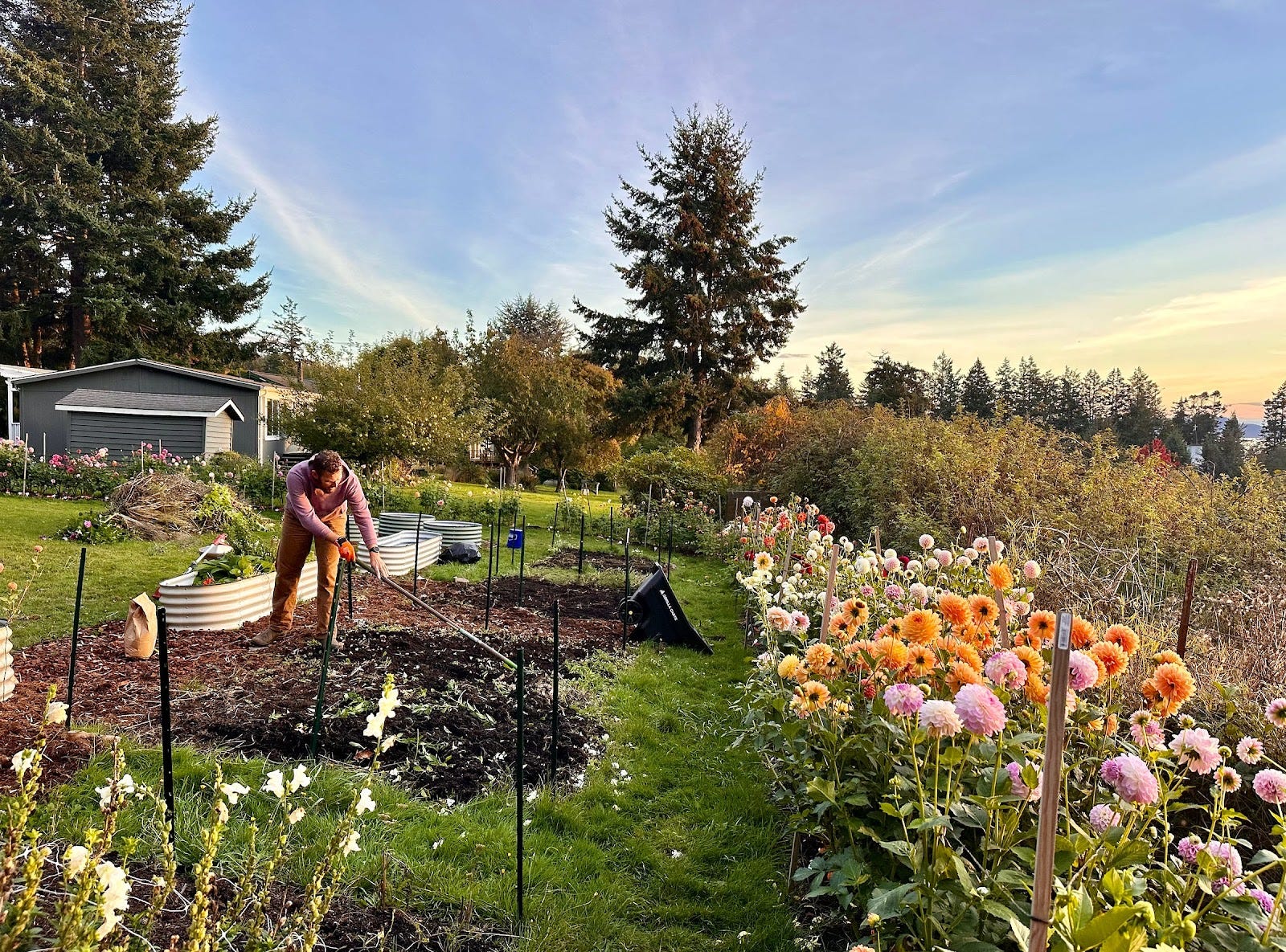Subscribers, be sure and check out this week’s Tuesday Thread on where to find/buy/source art — it’s lovely.
This past Sunday, I started digging and dividing dahlias at 8 am, and was on my feet (or bent over, pulling them from the ground) until 6 pm. My partner, Charlie, was helping out for the day, along with my dahlia growing partner Beth and her husband. We finished the day sore and accomplished. “I looked at my watch at like 11 am,” Charlie said as he collapsed on the couch. “And then when I looked at it again, it was somehow 3 pm — and not a single thought had passed through my brain??”
A good hobby — a hobby distant from the work you do for pay, a hobby that requires repetitive and often physical motion — can do that to you. Just utterly blank your mind in the most pleasurable way. I dug and divided dahlias all weekend, my body was exhausted, but I somehow felt restored.
Just six years ago, I didn’t have any hobbies. My hobby was job. More generously, my hobby was….walking the dogs? I had the memory of what a hobby felt like: a Saturday devoted to gardening, a weekend skiing, a summer week camping in the mountains. But I’d allowed my productivity brain to eat any and all time that might have been allocated to something that wasn’t work. My mantra, honed in grad school, remained the same: anything that felt good (like a hobby!) was bad, anything that felt bad (like working all the time!) was ultimately good.
Back in January of 2020, when I was still writing this newsletter as a hobby (extended lol) while working my full-time job, I wrote about the inklings of an (actual) hobby returning after going skiing for the first time in 12 years:
I grew up skiing at a small but mighty mountain in Central Idaho, a place where my brother, my friends, and their brothers spent our childhoods figuring out the limits of our bodies. We were almost entirely unsupervised; we were fast and often reckless; we spent seemingly endless hours trying to perfect one jump. We got better very gradually, over the course of more than a decade. We didn’t ski because it was cool, or because our parents forced us (although they certainly paid for it, even though our season passes were mind-bogglingly cheaper then) but just because it was what we did, every weekend we could. It didn’t feel like a choice, it just felt like a natural gravity.
To me, that’s what I think a real hobby feels like. Not something you feel like you’re choosing, or scheduling — not a hassle, or something you resent or feel bad about when you don’t do it. Earlier this week, Katie Heaney wrote a piece in The Cut that speaks to what I think a lot of people feel when they think about their hobbies: she keeps trying to start one, but can’t make it stick. The truth is, it’s really really hard to start a hobby as an adult — it feels unnatural, or forced, or performative. We try to force ourselves into hobbies by buying things (see: Amanda Mull’s piece on the “trophies” of the new domesticity) but a Kitchen-Aid will not make you like cooking.
It’s also hard when the messages about what you should be doing with your leisure time are so incredibly contradictory: you should devote yourself to self-care, but also spend more time on your children and partner; you should liberate yourself from the need to monetize your hobby but also have enough money to do the hobby in the first place. This “Smarter Living” piece in the NYT on what to do with a day off is emblematic of just how fucked up our leisure messaging has become: you should “embrace laziness,” “evaluate your career,” “have a family meal,” “fix your finances,” “do that one thing you’ve been putting off,” AND/OR “do nothing,” AND THEN tweet the author about what you did over the weekend!
Since then — and especially since making the decision to write this “hobby” newsletter full-time — I’ve gradually allocated more and more time to my hobbies, particularly dahlias and skiing. But I get a lot of questions: How do you do it, while also writing the newsletter twice a week every week, and writing a book, and producing a podcast, and running marathons, and giving the dogs at least 90 minutes of exercise a day, and sleeping well, and trying to be a good partner and friend and member of the community?



